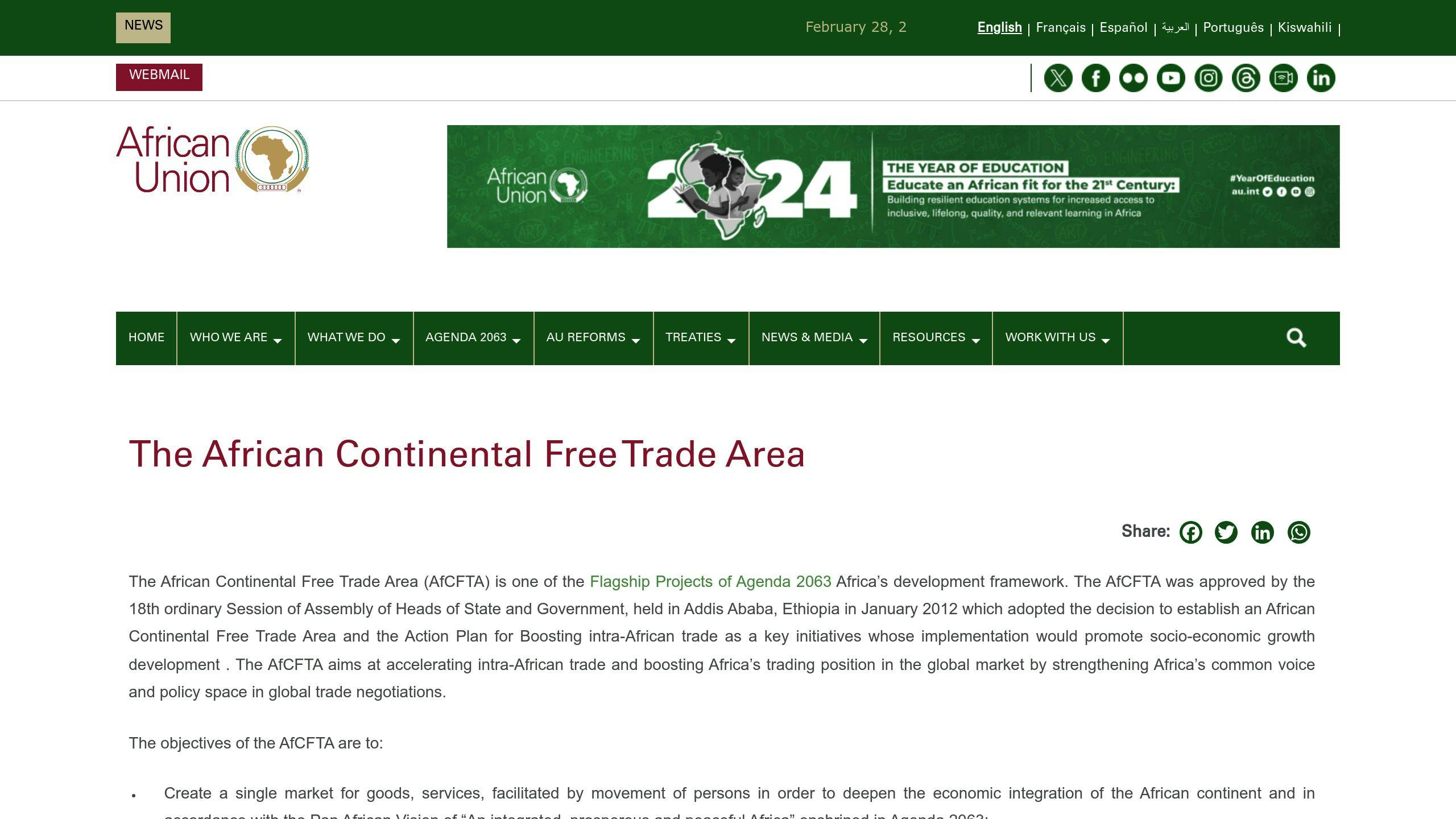Want to grow your African startup across borders? Here’s everything you need to know to succeed:
- Opportunities: Access to 54 markets, diverse revenue streams, and a larger talent pool.
- Challenges: Regulatory hurdles, high costs, and fragmented policies.
- Solutions: Leverage AfCFTA, regional economic groups (ECOWAS, EAC, SADC), and local partnerships.
- Key Steps:
- Research high-growth markets (GDP above 5%, digital adoption).
- Tailor products and marketing to local needs.
- Build strong local teams and partnerships.
- Ensure compliance with tax and legal frameworks.
Startups like Jumia, Flutterwave, and M-PESA have thrived by adapting to local markets, forming partnerships, and using technology. With AfCFTA reducing barriers, now is the time to plan your expansion.
Identifying Market Opportunities in Africa
Understanding Regional Economic Groups
Regional economic groups make it easier for businesses to expand across borders by aligning policies and improving infrastructure:
| Economic Group | Region | Key Advantages for Startups |
|---|---|---|
| ECOWAS | West Africa | Access to 15 countries, unified trade policies |
| EAC | East Africa | Common market framework, integrated payment systems |
| SADC | Southern Africa | Streamlined cross-border processes, shared infrastructure |
These groups provide helpful frameworks, but identifying specific markets with growth potential requires a closer look at economic and technological factors.
Finding High-Growth Markets
To pinpoint promising markets, startups should focus on indicators that reveal strong potential for cross-border success:
| Indicator | What to Look For | Impact on Expansion |
|---|---|---|
| GDP Growth | Annual growth above 5% | Signals an expanding consumer base |
| Digital Adoption | High usage of internet and mobile money | Opportunities in fintech and e-commerce |
| Regulatory Environment | Startup-friendly policies | Simplifies market entry and reduces barriers |
For example, Flutterwave focused on high-remittance markets with strong digital payment adoption, allowing it to expand across Africa and beyond [3]. These indicators help businesses prioritize markets where their operations are more likely to thrive.
Using Tech In Africa for Market Insights

Platforms like Tech In Africa provide valuable updates on market trends, regulations, and local ecosystems, helping startups fine-tune their strategies. Jumia’s success in 14 African countries highlights the importance of thorough research and adapting to local conditions [1].
The African Continental Free Trade Area (AfCFTA) has opened new doors for regional growth. Startups can use this agreement to cut entry costs and simplify cross-border operations. Although intra-African trade is currently just 15%, compared to 67% in Europe and 58% in Asia [2], AfCFTA is expected to drive significant growth, creating more opportunities for expansion.
Africa’s Startup Landscape: Insights on Market Entry and Growth
Legal and Compliance Requirements for Expansion
Expanding into new markets comes with legal and compliance challenges that startups must tackle to ensure success.
Registering a Business in Different Countries
The process of registering a business varies widely across African nations. To simplify this, the African Union Startup Model Law Framework encourages the use of OSS (One-Stop Shop) platforms, which streamline registration by combining multiple steps into one.
| Registration Aspect | Key Requirements | Impact |
|---|---|---|
| Documentation | Key documents like business plans and proof of capital | Early preparation prevents delays |
| Local Presence | May require a physical office | Requires budgeting and planning |
| Processing Time | Ranges from 2 to 60 days | Influences the overall timeline |
After registration, startups must also address complex tax regulations to ensure smooth cross-border operations.
Navigating Tax Laws and Compliance
Tax compliance plays a crucial role in cross-border expansion. The African Tax Administration Forum offers guidance on managing tax obligations. Startups need to account for factors like double taxation agreements, varying withholding taxes, and VAT thresholds to maintain healthy cash flow and competitive pricing.
“Understanding local tax obligations and establishing a local legal entity are crucial first steps for mitigating risks during expansion”, the African Tax Administration Forum advises [2].
Opportunities with the African Continental Free Trade Area (AfCFTA)

AfCFTA opens up new possibilities for startups by offering:
- Tariff Reduction: Gradual removal of tariffs on 90% of goods traded among member states.
- Simplified Trade: Standardized documentation and customs procedures across the region.
- Market Access: Broader opportunities for service-based startups in markets that were previously restricted.
To take full advantage of AfCFTA, startups should collaborate with local experts, create solid compliance plans, and keep an eye on ongoing developments.
The African Union Startup Model Law Framework complements these efforts by addressing regulatory inconsistencies and policy fragmentation [2]. By aligning with these frameworks, startups can position themselves for growth across the region.
sbb-itb-dd089af
Developing an Expansion Strategy
For African startups aiming to grow across borders, having a clear plan that balances consistency with local needs is crucial.
Adjusting Products or Services for New Markets
Expanding into new markets often requires more than just translating a product. It means tailoring it to meet specific local needs. Take Jumia, for example. Their e-commerce platform succeeded by making targeted changes:
| Adaptation Area | Implementation | Market Impact |
|---|---|---|
| Payment Systems | Added local mobile money and cash-on-delivery options | 40% more transactions completed |
| Operational Infrastructure | Built local warehouses, partnered for last-mile delivery, adjusted features and pricing | Delivery times down by 60%, tripled customer engagement |
Another standout example is M-PESA. By customizing its mobile money services to tackle financial inclusion issues in countries like Tanzania and Ghana, it saw widespread user adoption [1].
But tweaking products isn’t enough. Connecting with local audiences through culturally aware marketing is just as important.
Creating Culturally Relevant Marketing
To thrive in new African markets, marketing must feel personal and relevant. Twiga Foods nailed this with campaigns that reflected local farming practices and buyer habits [1].
What works? Marketing strategies that include:
- Adapting content for local social media platforms
- Using visuals that resonate culturally
- Addressing regional challenges with tailored messages
- Leveraging communication channels preferred in the area
Still, marketing alone won’t secure long-term success. Building a strong local team is essential for staying competitive.
Hiring and Managing Local Staff
When entering new markets, having the right local team makes all the difference. Here are some key approaches:
| Focus Area | Best Practice | Expected Outcome |
|---|---|---|
| Recruitment | Work with local agencies and universities | Access to skilled candidates |
| Training | Offer detailed onboarding programs | Faster employee integration |
| Management | Use hybrid leadership models | Improved understanding of local markets |
| Culture | Develop inclusive workplace policies | Increased employee retention |
Twiga Foods is a great example of how to do this right. By focusing on local talent development and clear career paths, they cut staff turnover by 75% and boosted operational efficiency in their new markets [1].
“We were targeting markets in America and the UK, thinking they were bigger, but we didn’t realize the challenges. It wasn’t just a market problem; it was a deeper issue.” – Mostafa Kandil, CEO of SWVL [3]
Funding and Partnerships for Growth
For African startups, finding the right funding and forming key partnerships are crucial steps to successfully expand across borders and grow sustainably.
Securing Funding for Regional Expansion
Expanding into new markets takes capital, and securing it means targeting the right sources with a clear plan for growth. Here’s a breakdown of some funding options:
| Funding Source | Advantages | What’s Needed |
|---|---|---|
| Venture Capital & Angel Networks | Access to significant capital, strategic advice, and local expertise | Proven growth metrics, scalable model, and a clear exit strategy |
| Impact Investors | Long-term funding with a focus on social impact | Demonstrated social benefits and outcomes |
| Development Banks | Lower interest rates and extended repayment terms | Detailed business plans and strong compliance records |
While funding provides the financial push, partnerships are equally important for breaking into new markets and scaling efficiently.
Establishing Strategic Partnerships
The right partnerships can simplify entry into new markets and help startups grow faster. Here’s how different types of partnerships add value:
| Partnership Type | How It Helps | Example in Action |
|---|---|---|
| Local Businesses | Offers market insights and infrastructure | Flutterwave’s partnerships with banks and payment processors |
| Government Agencies | Ensures regulatory compliance and opens market access | Twiga Foods’ work with agricultural boards |
| Distribution Networks | Provides logistics support and extends market reach | Jumia’s collaborations with local delivery companies |
“The African Continental Free Trade Area offers a critical opportunity for startups to expand regionally by removing tariffs and trade barriers” [1].
Beyond these partnerships, tapping into Africa’s growing startup ecosystem can provide additional tools and guidance for cross-border success.
Utilizing Startup Ecosystem Resources
Africa’s startup ecosystem is evolving rapidly and offers a range of resources to help businesses expand:
| Resource Type | Support Provided | Impact on Growth |
|---|---|---|
| Incubators | Technical advice and affordable workspace | Cuts operational costs |
| Accelerators | Mentorship and funding opportunities | Speeds up market entry |
| Industry Networks | Market insights and connections to partners | Boosts credibility and networking |
Combining these resources with a localized approach is key. Companies like Jumia have shown how tailoring strategies to each market can lead to success – they’ve expanded to 14 countries by adapting their operations to fit local needs [1]. Strong funding, valuable partnerships, and leveraging the ecosystem are the building blocks for effective cross-border growth.
Case Studies of Successful African Startups
Jumia‘s E-Commerce Expansion Journey

Jumia’s rise as a top e-commerce platform in Africa shows how a market-specific approach can drive cross-border growth. Starting in Nigeria, Jumia expanded into 14 countries by tailoring its strategies to each market [1]. Here’s how they did it:
| Strategic Focus | Implementation | Results |
|---|---|---|
| Infrastructure & Local Adjustments | Built warehouses and tailored business models | Improved delivery times and market reach |
| Distribution Network | Partnered with local delivery services | Strengthened last-mile delivery |
Jumia’s ability to create solutions for local challenges – like payment systems and delivery logistics – was crucial to its success.
Flutterwave‘s Fintech Expansion Strategies
Flutterwave focused on building a strong payment infrastructure to support cross-border transactions. Their approach revolved around creating an integrated payment ecosystem:
| Expansion Element | Strategy | Impact |
|---|---|---|
| Technology & Integration | Developed comprehensive payment systems | Enabled smooth cross-border payments |
| Strategic Partnerships | Partnered with financial institutions | Improved market access and regulatory alignment |
This combination of tech development and partnerships allowed Flutterwave to scale effectively in the fintech space.
M-PESA‘s Impact on Financial Inclusion
M-PESA’s success in expanding from Kenya to other African markets highlights how mobile money services can thrive by addressing the needs of underserved communities [1].
“M-PESA’s adaptability to different market conditions, particularly in addressing the unique needs of underserved populations with mobile-based financial solutions, was key to its success” [1].
Their strategy included:
| Focus Area | Implementation | Outcome |
|---|---|---|
| Market Understanding | Focused on research and community education | Built trust and boosted adoption |
| Mobile Integration | Used existing mobile networks | Achieved rapid user growth |
By leveraging mobile technology, M-PESA became a lifeline for communities with limited access to traditional banking.
These examples offer valuable insights into how African startups can navigate regional expansion. Whether it’s through tailored strategies, strong partnerships, or leveraging technology, these companies show how to succeed in diverse markets.
Conclusion: Key Points for Successful Expansion
Steps for Cross-Border Growth
Expanding into new regions demands a well-thought-out approach that balances opportunities with potential risks. The African Continental Free Trade Area (AfCFTA) offers a game-changing chance for startups by lowering entry barriers and encouraging regional collaboration [2].
To succeed in cross-border growth, focus on these essentials:
- Conducting detailed market research and choosing markets wisely
- Ensuring compliance with local laws and AfCFTA guidelines
- Building strong relationships with local partners
A great example of this is Twiga Foods. Instead of rushing into new markets like Nigeria, the company decided to strengthen its foothold in Kenya. This strategy of prioritizing their core market paid off, proving that sometimes, deeper local focus can outperform rapid regional expansion [1].
“Scaling is about creating sustainable, locally adapted solutions that drive Africa’s development” – Innocent, Innovation Advocate [2].
Future of Regional Expansion in Africa
The outlook for cross-border growth in Africa is bright, with AfCFTA paving the way for increased investments across the continent [2]. Companies like Rise are already showing how to navigate this landscape. In 2024, Rise acquired Kenya’s Hisa to address regulatory challenges head-on, setting an example for others [1].
For long-term success, startups need to strike a balance between adapting to local markets and leveraging their core strengths. Building strong partnerships and investing in technology will also be crucial. With a potential market of 1.3 billion people, the opportunities are immense for those who can master local dynamics while taking advantage of regional integration [2].
Startups that create scalable solutions tailored to local needs while maintaining efficiency across borders will thrive. As digital infrastructure improves and regional collaboration grows, African startups are in a prime position to execute smart and strategic expansion plans.









